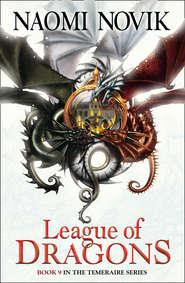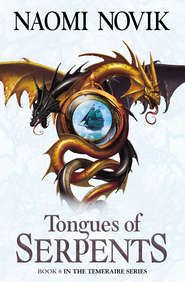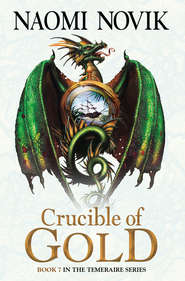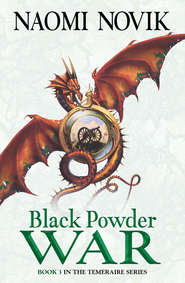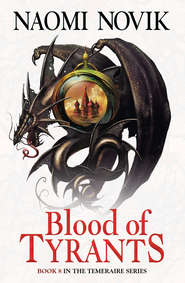По всем вопросам обращайтесь на: info@litportal.ru
(©) 2003-2024.
✖
Temeraire
Автор
Год написания книги
2019
Настройки чтения
Размер шрифта
Высота строк
Поля
It was still there shortly thereafter, when they met on the deck, and the man surrendered his sword, very reluctantly: at the last moment his hand half-closed about the blade, as if he meant to draw it back. Laurence looked up to make certain the colours had been struck, then accepted the sword with a mute bow; he did not speak French himself, and a more formal exchange would have to wait for the presence of his third lieutenant, that young man being presently engaged belowdecks in securing the French guns. With the cessation of hostilities, the remaining Frenchmen were all virtually dropping where they stood; Laurence noticed that there were fewer of them than he would have expected for a frigate of thirty-six guns, and that they looked ill and hollow-cheeked.
Many of them lay dead or dying upon the deck; he shook his head at the waste and eyed the French captain with disapproval: the man should never have offered battle. Aside from the plain fact that the Reliant would have had the Amitié slightly outgunned and outmanned under the best of circumstances, the crew had obviously been reduced by disease or hunger. To boot, the sails above them were in a sad tangle, and that no result of the battle, but of the storm which had passed but this morning; they had barely managed to bring off a single broadside before the Reliant had closed and boarded. The captain was obviously deeply overset by the defeat, but he was not a young man to be carried away by his spirits: he ought to have done better by his men than to bring them into so hopeless an action.
‘Mr. Riley,’ Laurence said, catching his second lieutenant’s attention, ‘have our men carry the wounded below.’ He hooked the captain’s sword on his belt; he did not think the man deserved the compliment of having it returned to him, though ordinarily he would have done so. ‘And pass the word for Mr. Wells.’
‘Very good, sir,’ Riley said, turning to issue the necessary orders. Laurence stepped to the railing to look down and see what damage the hull had taken. She looked reasonably intact, and he had ordered his own men to avoid shots below the waterline; he thought with satisfaction that there would be no difficulty in bringing her in to port.
His hair had slipped out of his short queue, and now fell into his eyes as he looked over. He impatiently pushed it out of the way as he turned back, leaving streaks of blood upon his forehead and the sun-bleached hair; this, with his broad shoulders and his severe look, gave him an unconsciously savage appearance as he surveyed his prize, very unlike his usual thoughtful expression.
Wells climbed up from below in response to the summons and came to his side. ‘Sir,’ he said, without waiting to be addressed, ‘begging your pardon, but Lieutenant Gibbs says there is something queer in the hold.’
‘Oh? I will go and look,’ Laurence said. ‘Pray tell this gentleman,’ he indicated the French captain, ‘that he must give me his parole, for himself and his men, or they must be confined.’
The French captain did not immediately respond; he looked at his men with a miserable expression. They would of course do much better if they could be kept spread out through the lower deck, and any recapture was a practical impossibility under the circumstances; still he hesitated, drooped, and finally husked, ‘Je me rends,’ with a look still more wretched.
Laurence gave a short nod. ‘He may go to his cabin,’ he told Wells, and turned to step down into the hold. ‘Tom, will you come along? Very good.’
He descended with Riley on his heels, and found his first lieutenant waiting for him. Gibbs’s round face was still shining with sweat and emotion; he would be taking the prize into port, and as she was a frigate, he almost certainly would be made post, a captain himself. Laurence was only mildly pleased; though Gibbs had done his duty reasonably, the man had been imposed on him by the Admiralty and they had not become intimates. He had wanted Riley in the first lieutenant’s place, and if he had been given his way, Riley would now be the one getting his step. That was the nature of the service, and he did not begrudge Gibbs the good fortune; still, he did not rejoice quite so wholeheartedly as he would have to see Tom get his own ship.
‘Very well; what’s all this, then?’ Laurence said now; the hands were clustered about an oddly placed bulkhead towards the stern area of the hold, neglecting the work of cataloguing the captured ship’s stores.
‘Sir, if you will step this way,’ Gibbs said. ‘Make way there,’ he ordered, and the hands backed away from what Laurence now saw was a doorway set inside a wall that had been built across the back of the hold; recently, for the lumber was markedly lighter than the surrounding planks.
Ducking through the low door, he found himself in a small chamber with a strange appearance. The walls had been reinforced with actual metal, which must have added a great deal of unnecessary weight to the ship, and the floor was padded with old sailcloth; in addition, there was a small coal-stove in the corner, though this was not presently in use. The only object stored within the room was a large crate, roughly the height of a man’s waist and as wide, and this was made fast to the floor and walls by means of thick hawsers attached to metal rings.
Laurence could not help feeling the liveliest curiosity, and after a moment’s struggle he yielded to it. ‘Mr. Gibbs, I think we shall have a look inside,’ he said, stepping out of the way. The top of the crate was thoroughly nailed down, but eventually yielded to the many willing hands; they pried it off and lifted out the top layer of packing, and many heads craned forward at the same time to see.
No one spoke, and in silence Laurence stared at the shining curve of eggshell rising out of the heaped straw; it was scarcely possible to believe. ‘Pass the word for Mr. Pollitt,’ he said at last; his voice sounded only a little strained. ‘Mr. Riley, pray be sure those lashings are quite secure.’
Riley did not immediately answer, too busy staring, then he jerked to attention and said, hastily, ‘Yes, sir,’ and bent to check the bindings.
Laurence stepped closer and gazed down at the egg. There could hardly be any doubt as to its nature, though he could not say for sure from his own experience. The first amazement passing, he tentatively reached out and touched the surface, very cautiously: it was smooth and hard to the touch. He withdrew almost at once, not wanting to risk doing it some harm.
Mr. Pollitt came down into the hold in his awkward way, clinging to the ladder edges with both hands and leaving bloody prints upon it; he was no kind of a sailor, having become a naval surgeon only at the late age of thirty, after some unspecified disappointments on land. He was nevertheless a genial man, well-liked by the crew, even if his hand was not always the steadiest at the operating table. ‘Yes, sir?’ he said, then saw the egg. ‘Good Lord above.’
‘It is a dragon egg, then?’ Laurence said. It required an effort to restrain the triumph in his voice.
‘Oh yes indeed, Captain, the size alone shows that.’ Mr. Pollitt had wiped his hands on his apron and was already brushing more straw away from the top, trying to see the extent. ‘My, it is quite hardened already; I wonder what they can have been thinking, so far from land.’
This did not sound very promising. ‘Hardened?’ Laurence said sharply. ‘What does that mean?’
‘Why, that it will hatch soon. I will have to consult my books to be certain, but I believe that Badke’s Bestiary states with authority that when the shell has fully hardened, hatching will occur within a week. What a splendid specimen, I must get my measuring cords.’
He bustled away, and Laurence exchanged a glance with Gibbs and Riley, moving closer so they might speak without being overheard by the lingering gawkers. ‘At least three weeks from Madeira with a fair wind, would you say?’ Laurence said quietly.
‘At best, sir,’ Gibbs said, nodding.
‘I cannot imagine how they came to be here with it,’ Riley said. ‘What do you mean to do, sir?’
His initial satisfaction turning gradually into dismay as he realized the very difficult situation, Laurence stared at the egg blankly. Even in the dim lantern light, it shone with the warm lustre of marble. ‘Oh, I am damned if I know, Tom. But I suppose I will go and return the French captain his sword; it is no wonder he fought so furiously after all.’
Except of course he did know; there was only one possible solution, unpleasant as it might be to contemplate. Laurence watched broodingly while the egg was transferred, still in its crate, over to the Reliant: the only grim man, except for the French officers. He had granted them the liberty of the quarter deck, and they watched the slow process glumly from the rail. All around them, smiles wreathed every sailor’s face, private, gloating smiles, and there was a great deal of jostling among the idle hands, with many un necessary cautions and pieces of advice called out to the sweating group of men engaged in the actual business of the transfer.
The egg being safely deposited on the deck of the Reliant, Laurence took his own leave of Gibbs. ‘I will leave the prisoners with you; there is no sense in giving them a motive for some desperate attempt to recapture the egg,’ he said. ‘Keep in company, as well as you can. However, if we are separated, we will rendezvous at Madeira. You have my most hearty congratulations, Captain,’ he added, shaking Gibbs’s hand.
‘Thank you, sir, and may I say, I am most sensible – very grateful—’ But here Gibbs’s eloquence, never in great supply, failed him; he gave up and merely stood beaming widely on Laurence and all the world, full of great goodwill.
The ships had been brought abreast for the transfer of the crate; Laurence did not have to take a boat, but only sprang across on the up-roll of the swell. Riley and the rest of his officers had already crossed back. He gave the order to make sail, and went directly below, to wrestle with the problem in privacy.
But no obliging alternative presented itself overnight. The next morning he bowed to necessity and gave his orders, and shortly the midshipmen and lieutenants of the ship came crowding into his cabin, scrubbed and nervous in their best gear; this sort of mass summons was unprecedented, and the cabin was not quite large enough to hold them all comfortably. Laurence saw anxious looks on many faces, undoubtedly conscious of some private guilt, curiosity on others; Riley alone looked worried, perhaps suspecting something of Laurence’s intentions.
Laurence cleared his throat; he was already standing, having ordered his desk and chair removed to make more room, though he had kept back his inkstand and pen with several sheets of paper, now resting upon the sill of the stern windows behind him. ‘Gentlemen,’ he said, ‘you have all heard by now that we found a dragon egg aboard the prize; Mr. Pollitt has very firmly identified it for us.’
Many smiles and some surreptitious elbowing; the little midshipman Battersea piped up in his treble voice, ‘Congratulations, sir!’ and a quick pleased rumble went around.
Laurence frowned; he understood their high spirits, and if the circumstances had been only a little different, he would have shared them. The egg would be worth a thousand times its weight in gold, brought safely to shore; every man aboard the ship would have shared in the bounty, and as captain he himself would have taken the largest share of the value.
The Amitié’s logs had been thrown overboard, but her hands had been less discreet than her officers, and Wells had learned enough from their complaints to explain the delay all too clearly. Fever among the crew, becalmed in the doldrums for the better part of a month, a leak in her water tanks leaving her on short water rations, and then at last the gale that they themselves had so recently weathered. It had been a string of exceptionally bad luck, and Laurence knew the superstitious souls of his men would quail at the idea that the Reliant was now carrying the egg that had undoubtedly been the cause of it.
He would certainly take care to keep that information from the crew, however; better by far that they not know of the long series of disasters which the Amitié had suffered. So after silence fell again, all Laurence said was simply, ‘Unfortunately, the prize had a very bad crossing of it. She must have expected to make landfall nearly a month ago, if not more, and the delay has made the circumstances surrounding the egg urgent.’ There was puzzlement and incomprehension now on most faces, though looks of concern were beginning to spread, and he finished the matter off by saying, ‘In short, gentlemen, it is about to hatch.’
Another low murmur, this time disappointed, and even a few quiet groans; ordinarily he would have marked the offenders for a mild later rebuke, but as it was, he let them by. They would soon have more cause to groan. So far they had not yet understood what it meant; they merely made the mental reduction of the bounty on an unhatched egg to that paid for a feral dragonet, much less valuable.
‘Perhaps not all of you are aware,’ he said, silencing the whispers with a look, ‘that England is in a very dire situation as regards the Aerial Corps. Naturally, our handling is superior, and the Corps can outfly any other nation of the world, but the French can outbreed us two to one, and it is impossible to deny that they have better variety in their bloodlines. A properly harnessed dragon is worth at least a first-rate of one hundred guns to us, even a common Yellow Reaper or a three-ton Winchester, and Mr. Pollitt believes from the size and colour of the egg that this hatchling is a prime specimen, and very likely one of the rare large breeds.’
‘Oh!’ said Midshipman Carver, in tones of horror, as he took Laurence’s meaning; he instantly went crimson as eyes went to him, and shut his mouth tight.
Laurence ignored the interruption; Riley would see Carver’s grog stopped for a week without having to be told. The exclamation had at least prepared the others. ‘We must at least make the attempt to harness the beast,’ he said. ‘I trust, gentlemen, that there is no man here who is not prepared to do his duty for England. The Corps may not be the sort of life that any of us has been raised to, but the Navy is no sinecure either, and there is not one of you who does not understand a hard service.’
‘Sir,’ said Lieutenant Fanshawe anxiously: he was a young man of very good family, and the son of an earl, ‘do you mean – that is, shall we all—’
There was an emphasis on that ‘all’ which made it obviously a selfish suggestion, and Laurence felt himself go near purple with anger. He snapped, ‘We all shall, indeed, Mr. Fanshawe, unless there is any man here who is too much of a coward to make the attempt, and in that case that gentleman may explain himself to a court martial when we put in at Madeira.’ He sent an angry glare around the room, and no one else met his eye or offered a protest.
He was all the more infuriated for understanding the sentiment, and for sharing it himself. Certainly no man not raised to the life could be easy at the prospect of suddenly becoming an aviator, and he loathed the necessity of asking his officers to face it. It meant, after all, an end to any semblance of ordinary life. It was not like sailing, where you might hand your ship back to the Navy and be set ashore, often whether you liked it or not.
Even in times of peace, a dragon could not be put into dock, nor allowed to wander loose, and to keep a full-grown beast of nine or ten tons from doing exactly as it pleased took very nearly the full attention of an aviator and a crew of assistants besides. They could not really be managed by force, and were finicky about their handlers; some would not accept management at all, even when new-hatched, and none would accept it after their first feeding. A feral dragon could be kept in the breeding-grounds by the constant provision of food, mates, and comfortable shelter, but they could not be controlled outside, and they would not speak with men.
So if a hatchling let you put it into harness, duty forever after tied you to the beast. An aviator could not easily manage any sort of estate, nor raise a family, nor go into society to any real extent. They lived as men apart, and largely outside the law, for you could not punish an aviator without losing the use of his dragon. In peacetime they lived in a sort of wild, outrageous libertinage in small enclaves, generally in the most remote and inhospitable places in all Britain, where the dragons could be given at least some freedom. Though the men of the Corps were honoured without question for their courage and devotion to duty, the prospect of entering their ranks could not be appealing to any gentleman raised up in respectable society.
Yet they sprang from good families, gentlemen’s sons handed over at the age of seven to be raised to the life, and it would be an impossible insult to the Corps to have anyone other than one of his own officers attempt the harnessing. And if one had to be asked to take the risk, then all; though if Fanshawe had not spoken in so unbecoming a way, Laurence would have liked to keep Carver out of it, as he knew the boy had a poor head for heights, which struck him as a grave impediment for an aviator. But in the atmosphere created by the pitiful request, it would seem like favouritism, and that would not do.
He took a deep breath, still simmering with anger, and spoke again. ‘No man here has any training for the task, and the only fair means of assigning the duty is by lot. Naturally, those gentlemen with family are excused. Mr. Pollitt,’ he said, turning to the surgeon, who had a wife and four children in Derbyshire, ‘I hope that you will draw the name for us. Gentlemen, you will each write your name upon a sheet here, and cast it into this bag.’ He suited word to deed, tore off the part of the sheet with his name, folded it and put it into the small sack.
Riley stepped forward at once, and the others followed suit obediently; under Laurence’s cold eye, Fanshawe flushed and wrote his name with a shaking hand. Carver, on the other hand, wrote bravely, though with a pale cheek; and at the last Battersea, unlike virtually all the others, was incautious in tearing the sheet, so that his piece was unusually large; he could be heard murmuring quietly to Carver, ‘Would it not be famous to ride a dragon?’
Laurence shook his head a little at the thoughtlessness of youth; yet it might indeed be better were one of the younger men chosen, for the adjustment would be easier. Still, it would be hard to see one of the boys sacrificed to the task, and to face the outrage of their families. But the same would be true of any man here, including himself.
Though he had done his best not to consider the consequences from a selfish perspective, now that the fatal moment was at hand he could not entirely suppress his own private fears. One small bit of paper might mean the wreck of his career, the upheaval of his life, disgrace in his father’s eyes. And, too, there was Edith Galman to think of; but if he were to begin excusing his men for some half-formed attachment, not binding, none of them would be left. In any case, he could not imagine excusing himself from this selection for any reason: this was not something he could ask his men to face, and avoid himself.






